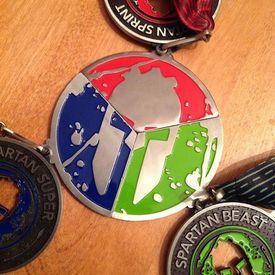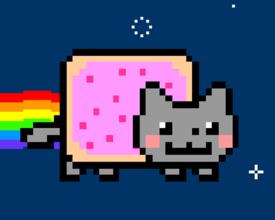Do I have to eat six small meals a day?

Stephanie198907
Posts: 163 Member
Just wondering if six small meals a day is what it takes to steadily and consistently lose weight/build muscle or is my eating at a deficit enough? I just started looking into amateur body building and a lot of the lifters eat six small high protein meals a day. So, should I adapt to the six meals a day or stick with my usual 3-4 meals per day (1 large meal, usually breakfast) and continue eating at a deficit and working out?
Thanks
Thanks
0
Replies
-
Eat when you're hungry, stay within your calories, you'll lose weight. it doesn't matter whether you eat 6 times a day or only once. Just find what works for you.0
-
I tried eating 6 small meals a day. I never got to eat enough at one sitting to not feel hungry. So for me, no. My answer to you is, "No, you don't HAVE to. Experiment and see how many meals works for you".0
-
I tried eating 6 small meals a day. I never got to eat enough at one sitting to not feel hungry. So for me, no. My answer to you is, "No, you don't HAVE to. Experiment and see how many meals works for you".
this was my issue as well. I've tried the six small meals before but I would always end up hungry about an hour after each meal. I thought I was crazy.
Also, what are the guidelines for a meal to be considered "small"? Either my meals were just too small or I didn't give myself enough time to adjust to eating small portions.0 -
Bro science silliness. Nothing more0
-
In order to build muscle mass after resistance training, and to prevent its loss when you are in a calorie deficit, your body needs a continuous supply of amino acids in the blood stream (from protein consumption). Amino acids aren't stored for later use, and your body can't really use more than about 30 grams every 2-3 hours, so that's one of the reasons for the multiple small, high protein meals.
The other benefit of many small meals is to avoid big swings in your energy balance. It's entirely possible to be in energy balance for the day (calories in = calories burned) but because of the timing of your meals and exercise, spend most of your day either in a calorie deficit or calorie surplus. The former tends to make you loss muscle mass, and the latter tends to make you build fat deposits.
Actual science, not bro science.0 -
Eat when you are hungry.
\thread0 -
I hear 12 meals a day is better.0
-
In order to build muscle mass after resistance training, and to prevent its loss when you are in a calorie deficit, your body needs a continuous supply of amino acids in the blood stream (from protein consumption). Amino acids aren't stored for later use, and your body can't really use more than about 30 grams every 2-3 hours, so that's one of the reasons for the multiple small, high protein meals.
The other benefit of many small meals is to avoid big swings in your energy balance. It's entirely possible to be in energy balance for the day (calories in = calories burned) but because of the timing of your meals and exercise, spend most of your day either in a calorie deficit or calorie surplus. The former tends to make you loss muscle mass, and the latter tends to make you build fat deposits.
Actual science, not bro science.
Thank you!0 -
In order to build muscle mass after resistance training, and to prevent its loss when you are in a calorie deficit, your body needs a continuous supply of amino acids in the blood stream (from protein consumption). Amino acids aren't stored for later use, and your body can't really use more than about 30 grams every 2-3 hours, so that's one of the reasons for the multiple small, high protein meals.
The other benefit of many small meals is to avoid big swings in your energy balance. It's entirely possible to be in energy balance for the day (calories in = calories burned) but because of the timing of your meals and exercise, spend most of your day either in a calorie deficit or calorie surplus. The former tends to make you loss muscle mass, and the latter tends to make you build fat deposits.
Actual science, not bro science.
Thank you!
B.S., but enjoy the silliness0 -
the short answer is no.
Stick to your calorie goals, and you can break it up however fits your life best. If that means 3 meals, great. If that means 6, that's fine too.0 -
I used to eat 3 meals a day like most people but my nutritionist recommended 6 small meals to keep blood sugar levels relatively stable throughout the day and provide the muscles with protein. I definitely lost weight last time I did this but I'm not sure if it's because of this or if is just because of the deficit alone.
Benefits (I found): -much less inclined to binge because when I ate every 3 hours I never let myself get too hungry
-Much easier to stop eating when I was done my food because I knew I would get to eat again in 3 more hours
-Less cravings
Cons: -Very inconvenient
-Awkward in social situations... I began planning my life around meals and it sort of took over.
You definitely train your body to be hungry every 3 hours if you eat every 3 hours though, I'll tell you that much!0 -
I used to eat 3 meals a day like most people but my nutritionist recommended 6 small meals to keep blood sugar levels relatively stable throughout the day and provide the muscles with protein. I definitely lost weight last time I did this but I'm not sure if it's because of this or if is just because of the deficit alone.
Benefits (I found): -much less inclined to binge because when I ate every 3 hours I never let myself get too hungry
-Much easier to stop eating when I was done my food because I knew I would get to eat again in 3 more hours
-Less cravings
Cons: -Very inconvenient
-Awkward in social situations... I began planning my life around meals and it sort of took over.
You definitely train your body to be hungry every 3 hours if you eat every 3 hours though, I'll tell you that much!
Are you diabetic? That's the only reason why your blood sugars would be out of whack when not eating constantly. Normal people can eat as few or as many times a day as they want without having to worry about blood sugar, so long as you meet your calorie goals. How do I know this? Go to Walmart and buy a blood glucose kit to test for yourself. You can visually see first hand how not eating every 6 hours impacts your levels. A blood glucose kit is only 5 dollars.
Edit
I've already tested this on myself and blood sugar levels remain constant. If you wake up in the morning and it reads 85, it will be 85 ten hours later even if you haven't had a meal.
.0 -
In order to build muscle mass after resistance training, and to prevent its loss when you are in a calorie deficit, your body needs a continuous supply of amino acids in the blood stream (from protein consumption). Amino acids aren't stored for later use, and your body can't really use more than about 30 grams every 2-3 hours, so that's one of the reasons for the multiple small, high protein meals.
The other benefit of many small meals is to avoid big swings in your energy balance. It's entirely possible to be in energy balance for the day (calories in = calories burned) but because of the timing of your meals and exercise, spend most of your day either in a calorie deficit or calorie surplus. The former tends to make you loss muscle mass, and the latter tends to make you build fat deposits.
Actual science, not bro science.
Can you explain how the guys in the link below have such nice bodies by eating only twice a day? Maybe they're not human? http://www.youtube.com/watch?v=hzfsaXsV-T4 0
http://www.youtube.com/watch?v=hzfsaXsV-T4 0 -
Nope. Just do what works for you.0
-
No science (or bro-science) here, just some educated cogitation regarding 6 "small meals" a day for competitive lifting/body building.
The term "small" is relative. A 180-200lb man doing heavy training for competitive lifting/bod building probably consumes about 2800-3400 calories a day. 6 "small" meals of 466-566 calories may be easier for some to consume than consuming 1000+ calories at one sitting. 3 times a day.
Just my thoughts.0 -
No science (or bro-science) here, just some educated cogitation regarding 6 "small meals" a day for competitive lifting/body building.
The term "small" is relative. A 180-200lb man doing heavy training for competitive lifting/bod building probably consumes about 2800-3400 calories a day. 6 "small" meals of 466-566 calories may be easier for some to consume than consuming 1000+ calories at one sitting. 3 times a day.
Just my thoughts.
makes total sense. thank you!!!0 -
In order to build muscle mass after resistance training, and to prevent its loss when you are in a calorie deficit, your body needs a continuous supply of amino acids in the blood stream (from protein consumption). Amino acids aren't stored for later use, and your body can't really use more than about 30 grams every 2-3 hours, so that's one of the reasons for the multiple small, high protein meals.
The other benefit of many small meals is to avoid big swings in your energy balance. It's entirely possible to be in energy balance for the day (calories in = calories burned) but because of the timing of your meals and exercise, spend most of your day either in a calorie deficit or calorie surplus. The former tends to make you loss muscle mass, and the latter tends to make you build fat deposits.
Actual science, not bro science.
Cite plz? I call bullsh1t0 -
Maybe true to a dergee, but not enough to make a big differance. Just get all your calories you need for the day.0
-
In order to build muscle mass after resistance training, and to prevent its loss when you are in a calorie deficit, your body needs a continuous supply of amino acids in the blood stream (from protein consumption). Amino acids aren't stored for later use, and your body can't really use more than about 30 grams every 2-3 hours, so that's one of the reasons for the multiple small, high protein meals.
The other benefit of many small meals is to avoid big swings in your energy balance. It's entirely possible to be in energy balance for the day (calories in = calories burned) but because of the timing of your meals and exercise, spend most of your day either in a calorie deficit or calorie surplus. The former tends to make you loss muscle mass, and the latter tends to make you build fat deposits.
Actual science, not bro science.
Haha. Actual science? Really? Please direct me to just ONE study supporting this.0 -
No. Just eat however it works for you and your day.
 0
0 -
Do what works for you. Stay within your calorie count for the 24 hr. period.0
-
In order to build muscle mass after resistance training, and to prevent its loss when you are in a calorie deficit, your body needs a continuous supply of amino acids in the blood stream (from protein consumption). Amino acids aren't stored for later use, and your body can't really use more than about 30 grams every 2-3 hours, so that's one of the reasons for the multiple small, high protein meals.
The other benefit of many small meals is to avoid big swings in your energy balance. It's entirely possible to be in energy balance for the day (calories in = calories burned) but because of the timing of your meals and exercise, spend most of your day either in a calorie deficit or calorie surplus. The former tends to make you loss muscle mass, and the latter tends to make you build fat deposits.
Actual science, not bro science.
Sorry to be curt, but essentially everything you have posted is well-known to be nothing but myths. I would recommend a little research before giving advice on this topic again.0 -
I think it's an "if it works for you" kind of thing. The problem I see with it is you have to find time for those 6 meals, you have to find time to prepare them, and I don't want to be married to worrying about my next meal in 2-3 hours. Then if you miss one, you've conditioned your body to eat every 3 hours, now you are hungry and might end up bingeing.
I like my 2-3 bigger meals a day.0
This discussion has been closed.
Categories
- All Categories
- 1.4M Health, Wellness and Goals
- 398.5K Introduce Yourself
- 44.7K Getting Started
- 261K Health and Weight Loss
- 176.4K Food and Nutrition
- 47.7K Recipes
- 233K Fitness and Exercise
- 462 Sleep, Mindfulness and Overall Wellness
- 6.5K Goal: Maintaining Weight
- 8.7K Goal: Gaining Weight and Body Building
- 153.5K Motivation and Support
- 8.4K Challenges
- 1.4K Debate Club
- 96.5K Chit-Chat
- 2.6K Fun and Games
- 4.8K MyFitnessPal Information
- 18 News and Announcements
- 21 MyFitnessPal Academy
- 1.5K Feature Suggestions and Ideas
- 3.2K MyFitnessPal Tech Support Questions












